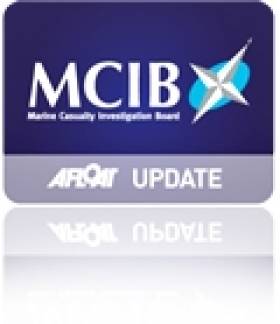Displaying items by tag: Na Buachaillí
MCIB Again Cites Lack of Lifejackets in Na Buachaillí Capsize Death
#MCIB - Marine investigators have again highlighted the lack of lifejackets as contributing to loss of life in the official report into the capsizing of a fishing vessel off Co Wexford last year.
Crewman John Ennis was lost when the two-man vessel Na Buachaillí capsized and sank close to the shore in Waterford Estuary near Duncannon on 18 February 2011.
Skipper and owner Richard McNamara survived the incident. More than a month later, Ennis's body was recovered from the water on 21 March 2011. Neither man had been wearing a lifejacket despite all requisite safety equipment being available.
According to the report from the Marine Casualty Investigation Board (MCIB), the boat had been dredging for mussels in the estuary – using a custom gantry installed at the stern – when McNamara steered to port to make way for a merchant ship and the Waterford pilot boat which were coming down river.
Using a motorised winch, McNamara hoisted the dredge to which Ennis attempted to attach the line when the vessel began to list to starboard. The skipper returned to the winch controls but was unable to drop the dredge. He saw that Ennis was holding onto the dredge gantry, bracing himself against the list.
McNamara then tried to enter the wheelhouse to activate the EPIRB emergency beacon but the boat was now listing rapidly and he was forced by a rush of seawater into an area forward of the engine under the forward deck.
By a quirk of fate the water flow suddenly reversed and McNamara was thrown out of the wheelhouse, and he just managed to grab gold of a lifering mounted on the wheelhouse roof before swomming to shore to raise the alarm.
The vessel was later recovered by Naval divers who found no damage to the hull nor any evidence that the dredge or any other part of the boat has been snagged by something in the water.
Based on the evidence gathered by investigators, the most likely reason for the capsize was the result of instability resulting from the vessels position between the onshore wind and the outgoing tide, exacerbated by the vessel's higher than recommended breadth-to-depth ratio.
The listing was compounded by the boat's interconnected fuel tanks, while the distribution of the mussel catch on deck and the apparent starboard lean of the suspended dredge may have also played a role.
Echoing its recent reports into the drowning of three men on a fishing trip of West Cork in August 2010, as well as the loss of two lobstermen off Skerries in April 2011, the MCIB recommends that lifejackets be worn at all times while on a vessel.
It also notes that emergency beacons should be mounted outside the wheelhouse for better accessibility and preferably be of the automatic free-float type.
Additionally, the MCIB has called for proper authorisation of physical alteratuons to small fishing vessels that may affect stability, and recommends revisions of the Department of Transport, Tourism and Sport's (DTTAS) Code of Practice for such vessels under 15m in length with reference to stability, EPIRBs and life rafts.
The full report is available to download as a PDF from the MCIB website HERE.
























































